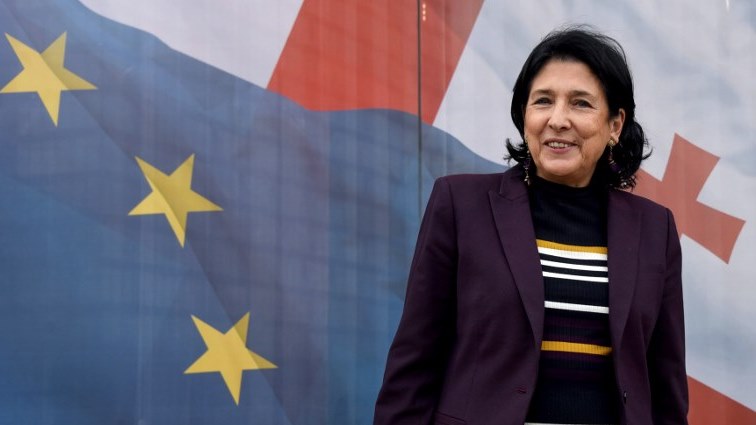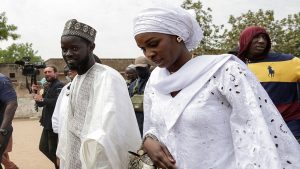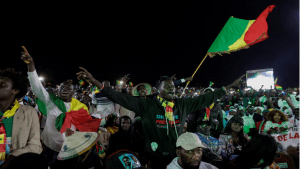When Salome Zurabishvili arrived in Georgia in 2004 as French ambassador, few could have predicted that 15 years later she would be favourite to be elected president of the ex-Soviet nation.
The Caucasus country votes Sunday in a hotly contested race that has pitted Zurabishvili, supported by the ruling Georgian Dream party, against opposition-backed Grigol Vashadze.
The position of president will be largely ceremonial following a change to the constitution but the polls are seen as a test for the increasingly unpopular Georgian Dream.
Zurabishvili’s unorthodox path to the candidacy has also generated interest.
“I always thought that one day I will help — in some function, in some capacity — this country to move to democracy,” Zurabishvili told AFP in an interview conducted in English.
But “decades ago, as a young French diplomat, I couldn’t have imagined I will be running for the presidency of my ancestral homeland, which back then was firmly in the Soviet empire’s claws.”
The stylish 66-year-old, currently an independent MP, is the daughter of refugees who fled Georgia in 1921 for Paris after the country’s annexation by the Red Army.
Her career in France’s foreign ministry culminated in her posting to Tbilisi.
From that position former president Mikheil Saakashvili appointed her foreign minister — after approving the move with then French leader Jacques Chirac.
But Zurabishvili quickly made enemies in the ranks of the parliamentary majority, with MPs and a number of senior diplomats publicly accusing her of arrogance and impulsivity.
She was sacked after a year on the job, though thousands took to the streets of the capital to protest her dismissal.
She then joined the opposition and became one of Saakashvili’s fiercest critics.
In her book “A Woman for Two Countries”, published in France after her firing, she wrote: “Now, I have to engage in a political battle, which has never attracted me, which I never practised, which is being imposed on me.”
She speaks Georgian with a strong French accent and frequent grammatical mistakes.
Opinion polls put opposition candidate Vashadze almost even with Zurabishvili, who renounced her French citizenship to be able to stand.
Vashadze is a respected career diplomat who served in the Soviet foreign ministry where he helped craft the Soviet-US treaty on the reduction and limitation of strategic offensive arms.
The 60-year-old was Saakashvili’s foreign minister from 2008-2012.
Vashadze is married to the world-renowned prima ballerina Nina Ananiashvili, who has been described in the foreign press as one of the greatest ballet dancers of all time.
Both candidates have campaigned on similar promises to bring Georgia closer to full membership of the European Union and NATO.
The country of some 4.5 million people has knocked on NATO’s doors for more than a decade but the bloc has refused to put Tbilisi on a formal membership path, despite a pledge in 2008 that it will at some point be admitted to the club.
Vashadze, backed by the United National Movement founded by Saakashvili and 10 other opposition groups, has been boosted by discontent over the government’s failure to tackle poverty.
Over a fraught campaign he has lashed out against what he says is official graft and political meddling in the judiciary.
He has also criticised the “informal oligarch rule” of Bidzina Ivanishvili, the billionaire leader of the Georgian Dream party.
On the campaign trail Zurabishvili and the Georgian Dream have slammed the United National Movement for alleged human rights abuses during its previous stretch in power.
The vote is Georgia’s last direct leadership poll as the Black Sea nation transitions to a parliamentary form of governance following a controversial constitutional reform.
The inauguration of a new president will pave the way for the new constitution to enter into force, making the head of state a largely ceremonial figure.
Georgia’s next president will be elected in 2024 by a 300-member electoral college.
Adopted in September 2017, the constitutional change was protested by all opposition parties which have denounced it as favouring the ruling party.
Georgia’s outgoing President, Giorgi Margvelashvili, refused to run for a second term, saying he is not interested in assuming the reduced role.
Over 3.5 million people are eligible to vote in the election which will be monitored by international observers from the Organisation for Security and Cooperation in Europe.
Polls open at 0400 GMT and close at 1600 GMT, with results expected to start coming in overnight.






